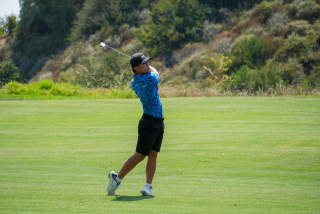Golfers Welcome New Amateur Rules
- Share via
Most top amateur golfers have heard the voice.
It whispers after a particularly good shot, it tempts after an under-par round and beckons after each high finish in a tournament.
“You’re ready to play professionally,” it says.
The winner of the Southern California Amateur championship this weekend at La Jolla Country Club might hear that voice.
If so, it may be more difficult to ignore now than ever before because earlier this month the U.S. Golf Assn. approved two significant changes in the rules for amateur status.
First, any amateur golfer entering a professional qualifying tournament (Q-school) may choose to remain an amateur after Q-school. Also, amateurs will be permitted to receive free merchandise from equipment manufacturers.
Currently, either practice is an automatic forfeiture of amateur status under USGA rules.
The changes put the USGA rules in harmony with those of the Royal and Ancient, which governs the rules of amateur status everywhere but North America.
The Q-school rule makes the lure of big money in professional golf more tempting and makes an attempt to get a piece of that money a far less risky venture.
“It’s a perfect rule for someone like me,” said Greg Puga of Los Angeles, the current U.S. Mid-Amateur champion. “Before, it was like you go to Q-school and if you don’t make it, then what? I don’t want to play on some mini-tour or foreign tour. If I’m not on the PGA Tour or the Buy.com, I would rather stay an amateur.”
Most view the Q-school rule as a welcome change, though there are those who warn that it may give amateurs false hope.
“A lot of people have pipe dreams,” said Tim Hogarth of Northridge, a former U.S. Amateur Public Links champion and four-time Los Angeles City champion.
“The first stage of tour school is going to be overcrowded with people that don’t need to be there. But if you have the idea of making it in your mind, you need to satisfy that.”
Those who stand to benefit the most are 50 and older. With a limited number of spots open on the Senior PGA Tour each year and virtually no other professional opportunities for seniors, the senior amateurs have been reluctant to try Q-school.
The equipment rule change is seen as a way to level the playing field between college players and other amateurs. College players are allowed to receive free equipment through their schools.
It’s also seen as a move to legalize a difficult-to-police practice already taking place at the upper echelon of amateur golf.
“I think it legitimizes some of the things already going on in our sport,” said Tom Morgan, executive director of the Southern California Golf Assn. “It’s putting the rules more in step with reality.”
It is not likely that equipment manufacturers will flood the market with free clubs. After all, amateur players are their best customers. Companies are more likely to single out a few elite players.
“Simple economics will rule,” said Mark King, President of Taylor Made-Adidas Golf. “We can’t be giving away thousands of clubs and still expect to sell anything.”
But the equipment rule also opens the doors to other scenarios, such as shady practices at the junior level. Today, junior players such as Ty Tryon and Aree and Naree Wongluekiet are making a splash on the professional circuit.
It is not difficult to envision equipment manufacturers getting into a battle to earn favor with such elite players in hopes of signing them to a deal later or pressuring them to turn pro early. Such a practice is common on the high school basketball scene, which has developed a seedy reputation.
“I could definitely see that happening,” said Taylor Wood of Laguna Niguel, the 25th-ranked junior player in the nation. “I know if a company helped me out now, down the road, I’d definitely hold them in high regard.”
Several college coaches have voiced concern that the Q-school rule will deplete their squads because players will be more willing to try Q-school.
Those who do and fail, however, might not be allowed to return to the Division I level.
NCAA spokesperson Jane Jankowski said any attempt at Q-school is viewed by the NCAA as an attempt to professionalize and thus anyone who plays in Q-school would lose their NCAA eligibility.
“The NCAA rules haven’t changed,” Jankowski said. “I’m not aware of any plan to change that rule.”
More to Read
Go beyond the scoreboard
Get the latest on L.A.'s teams in the daily Sports Report newsletter.
You may occasionally receive promotional content from the Los Angeles Times.










